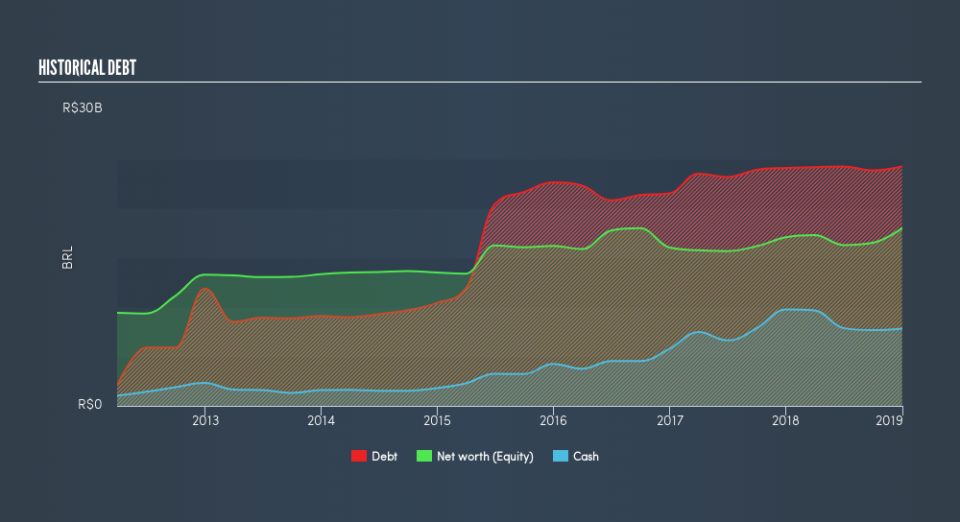Does Cosan Limited’s (NYSE:CZZ) Debt Level Pose A Problem?

Small and large cap stocks are widely popular for a variety of reasons, however, mid-cap companies such as Cosan Limited (NYSE:CZZ), with a market cap of US$2.7b, often get neglected by retail investors. While they are less talked about as an investment category, mid-cap risk-adjusted returns have generally been better than more commonly focused stocks that fall into the small- or large-cap categories. Today we will look at CZZ’s financial liquidity and debt levels, which are strong indicators for whether the company can weather economic downturns or fund strategic acquisitions for future growth. Note that this commentary is very high-level and solely focused on financial health, so I suggest you dig deeper yourself into CZZ here.
View our latest analysis for Cosan
CZZ’s Debt (And Cash Flows)
CZZ’s debt level has been constant at around R$24b over the previous year including long-term debt. At this constant level of debt, CZZ currently has R$7.8b remaining in cash and short-term investments to keep the business going. On top of this, CZZ has generated cash from operations of R$5.4b over the same time period, leading to an operating cash to total debt ratio of 22%, indicating that CZZ’s debt is appropriately covered by operating cash.
Can CZZ pay its short-term liabilities?
Looking at CZZ’s R$6.2b in current liabilities, it seems that the business has maintained a safe level of current assets to meet its obligations, with the current ratio last standing at 1.92x. The current ratio is the number you get when you divide current assets by current liabilities. Generally, for Oil and Gas companies, this is a reasonable ratio since there’s a sufficient cash cushion without leaving too much capital idle or in low-earning investments.
Does CZZ face the risk of succumbing to its debt-load?
With total debt exceeding equity, CZZ is considered a highly levered company. This is not uncommon for a mid-cap company given that debt tends to be lower-cost and at times, more accessible. We can check to see whether CZZ is able to meet its debt obligations by looking at the net interest coverage ratio. A company generating earnings before interest and tax (EBIT) at least three times its net interest payments is considered financially sound. In CZZ’s, case, the ratio of 2.67x suggests that interest is not strongly covered, which means that lenders may refuse to lend the company more money, as it is seen as too risky in terms of default.
Next Steps:
CZZ’s high cash coverage means that, although its debt levels are high, the company is able to utilise its borrowings efficiently in order to generate cash flow. Since there is also no concerns around CZZ’s liquidity needs, this may be its optimal capital structure for the time being. This is only a rough assessment of financial health, and I’m sure CZZ has company-specific issues impacting its capital structure decisions. I recommend you continue to research Cosan to get a better picture of the mid-cap by looking at:
Future Outlook: What are well-informed industry analysts predicting for CZZ’s future growth? Take a look at our free research report of analyst consensus for CZZ’s outlook.
Valuation: What is CZZ worth today? Is the stock undervalued, even when its growth outlook is factored into its intrinsic value? The intrinsic value infographic in our free research report helps visualize whether CZZ is currently mispriced by the market.
Other High-Performing Stocks: Are there other stocks that provide better prospects with proven track records? Explore our free list of these great stocks here.
We aim to bring you long-term focused research analysis driven by fundamental data. Note that our analysis may not factor in the latest price-sensitive company announcements or qualitative material.
If you spot an error that warrants correction, please contact the editor at editorial-team@simplywallst.com. This article by Simply Wall St is general in nature. It does not constitute a recommendation to buy or sell any stock, and does not take account of your objectives, or your financial situation. Simply Wall St has no position in the stocks mentioned. Thank you for reading.

